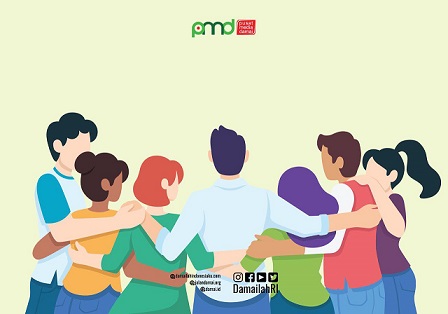Moderation and Tolerance: The Challenge of Ethics and Positive Content in the Cyberspace Era
By: Singgih Swasono )*
Virtual world (virtual) becomes a potential media to transform moderate and tolerant values. But on the other hand, the dynamics of cyberspace are recognized also cause dilemmas. Both the positive and negative sides of the content and its effects are almost as strong as their existence. The main factor that is able to control is the culprit.
The presence of smart netizens is a consequence and necessity. Fair regulation and enforcement is still easily hit because it is considered to clash with freedom and interests. Virtual ethics is needed as a fundamental character of smart netizens to mainstream cyberspace with moderation and tolerance.
The Challenge of the Post-Truth Era
Social media now appears powerful. On the other hand, distrust of facts and data presented by related institutions and mainstream mass media is getting bigger. This phenomenon reinforces that the existence of the post truth era (post truth) in Indonesia still occurs.
Viral is not always a good indicator of important things. Viral content that is shared repeatedly is often based on things that are not accurate. verify source and context. The most striking feature of fake news is the lack of resources. Fake news can survive in the community because we are constantly bombarded with that information. And do not be too confident with news circulating on social media and not from news sites that are guaranteed the truth. Social media allows everyone to convey information that looks like a real thing.
Hot content and its spread are not justified in religion. Many hoaks phenomena are recorded in the Koran. For example in the story of the Prophet Adam and Eve who were fooled by the hoax news delivered by the devil about the ‘tree of eternity’ to result in the expulsion of Prophet Adam and Eve from heaven. Furthermore, in the story of Pharaoh, the ruler who made hoax news and formed public opinion about Prophet Moses, who said he wanted to coup the ruler and expel his people. And there are still many other historical recordings.
Actualization of Ethics
A moderate and tolerant person is the demand and dream of every person. Now, ethics is not enough from the aspect of religiosity and social, but also needs to be emitted in the virtual world. Even the main foundation and guidelines remain on the religious aspect. Some important things are considered in order to form and actualize virtual ethics.
Virtual ethics is not merely shown textually but more importantly is contextual. Disclosure of the arguments as the basis for argumentation will further strengthen actualization. Especially if you face digital radicalism content.
The theological approach that is easily accepted by cyberspace audiences is important. Wisdom can be strengthened. Important open discussions are cultivated. And if needed, debate that upholds ethics is needed.
Smart netizens must be role models and give a positive aura through their virtual ethics. Thus, all arguments and distribution of positive content from it will be easily accepted and followed by other netizens.
Virtual ethics must be revealed through a cool atmosphere so that netizens feel comfortable. Splits must be a priority that is avoided. Besides the truth, unity must be the main focus.
Virtual ethics can be a fundamental character to counteract digital radicalism. Therefore the formation must be massive through joint movements. One or two important social celebrities are indeed made as moderate and tolerant icons. The goal is that all netizens are interested in following and dipping their characters into moderate and tolerant individuals.
*) Netizen-Student Sospol of Jayabaya University
